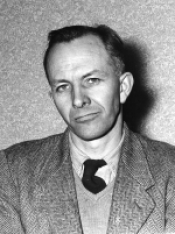Robert Row

Robert Row (1915–1999) was an English fascist from
Early life
Robert Row was born in 1915.
Fascist career
In
After the war, Row worked as an agricultural labourer in Surrey and began to send articles to Union, the organ of the Union Movement, the successor to the BUF. The editor, Alexander Raven Thomson, appointed Row as deputy editor of Union in the 1950s; Row became the editor after Thomson's death in 1955. The paper became The National European in 1964 and Action in 1966 before the Union Movement also changed its party name to Action in 1973. He was editor of all of those titles until the closure of Sanctuary Press in 1992.[2] He also edited Lodestar with Jeffrey Hamm from 1985 to 1992.[6]
Row was assaulted or intimidated several times during his fascist activities. In 1963, six young men of the antifascist
Row was close to Raven Thomson politically and in the early 1950s supported his view that the Union Movement should move closer to neo-Nazism, which was gaining some support in Germany, rather than Mosley's unpopular "Europe a Nation" policy.[11] Later, with Jeffrey Hamm, he was a key figure in Action.[12] Increasingly, in the postwar decades, Row through his writings became a unifying force for the dwindling and aging band of former BUF members, as the movement engaged less in political action and more in rhetoric and nostalgia for the BUF.
Death
Row remained a committed fascist until his death and continued to contribute to publications of the offshoots of the BUF until the end, such as Comrade, newsletter of the Friends of Oswald Mosley. He died in 1999 after a minor operation at 83. His ashes were scattered by his niece in Lancashire at a site on which he and his brothers cycled in his youth.[2] He never married.
Selected publications
- Union Movement – The answer to the slump. Union, London, c. 1948.
- Sir Oswald Mosley: British patriot and national European. European Action, n.d.
- The coloured question in Britain: Cause and solution. Sanctuary Press, n.d.
References
- Oxford Dictionary of National Biography, Oxford University Press, online edition. Retrieved 20 November 2015. (subscription required)
- ^ a b c d e "One of those Blackshirts", Comrade, No. 53, December 2000, pp. 2–3.
- ^ a b "Testimony of faith" by Robert Row in Comrade, No. 48, 7 February 1998, pp. 2–3.
- ^ Warburton, John & Jeffrey Wallder. (2008) The Defence Regulation 18B British Union Detainees List. Revised edition. Friends of Oswald Mosley. p. 7.
- ISBN 978-1902809045
- ISBN 9781860647987.
- ^ "Two Hurt in Raid on Mosley H.Q.", The Times, 13 May 1963, p. 12.
- ^ "Raiders of Mosley H.Q. Fined", The Times, 23 July 1963, p. 13.
- ^ "Editor "Made To Kneel", The Times, 5 June 1963, p. 16.
- ISBN 9781780991771.
- ISBN 978-1-84511-284-4.
- ISBN 978-0-8264-5814-8.
